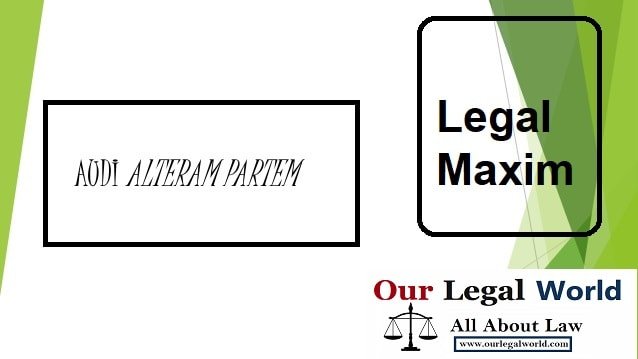AUDI ALTERAM PARTEM- Legal Maxim
Introduction
The principle of natural justice is been developed by the courts. In order to receive justice from the administrative agencies, the judgement been given by the courts should be fair and reasonable. The rule of natural justice provides with no partiality during any activity. It treats every act equally without any partiality.
The principle of natural justice not only seeks justice but also prevents miscarriage of justice. In India, the principle of natural justice can be found in Article 14 and Article 21 of the Indian constitution. Article 14 deals in treating every citizen equally and providing equal protection before law, whereas, Article 21 talks about protection of life and personal liberty.
MEANING
The rule of ‘Audi Alteram Partum’ is the basic concept of principle of natural justice. The maxim states “hear the other side” which means no man should be left unheard in the court of law during any proceeding or before passing any order, i.e.,both the parties will get equal opportunity to say or express their thoughts before the delivery of any order by the court.
ESSENTIAL ELEMENTS OF MAXIM
Following are the essentials of maxim:-
Notice
In order to take any action against the party, it is important to give notice the party give notice to the party containing facts of the case and the issue been raised on him by which he could protect himself by by preparing for the hearing. If any order is passed without the issuance of the notice to the party, then it is against the principle of natural justice. It is the right of the person to know about the facts before any action is to be taken. Right to Notice means Right to be Known. Notice must be adequate, if any of the thing is missed in the notice then the notice will be considered invalid.
Hearing
It is the most important element of the principle Audi Alteram Partum, which is fair hearing. It states that if any order is passed without hearing the party or without giving him opportunity of being heard then it will be considered as invalid.
In case Keshav Mills co. ltd v. Union of India
It was held that, the notice given to the parties should be clear, adequate and unambiguous, if it is unclear or ambiguous then the notice will not be considered as reasonable and proper.
- Evidence
It is an important part where evidence is to be brought in the courts in the presence of both the parties and the judicial authority has to act upon the evidence being produced in the courts.
In case, Stafford v. Minister of Health;
It was held that no evidence should be received in the absence of the other party, if any of the pieces of evidence been recorded it is the duty of the court to make it available to the other party.
In case, Hira Nath v. Principal;
It wad held that, the principal is not confined to formal evidence but extends to any material including information regarding previous conviction upon which the tribunal may act, without giving any opportunity to the affected party to rebut it.
- Cross-Examination
The authority in the fair hearing is not required to disclose the person concerned, the material or evidence to be taken against him, he should be provided or given the opportunity to deny to the evidence or the material. The question that arises to the court is whether the witness will be examined or not.
Legal Representation
In the process, every party has the right to have a legal representative who will represent him in the courts. Each party will have a legally trained person who will present him and no one can deny. But in certain situations, if right to legal representation is denied it leads to a violation of the principle of natural justice.
Also Read: Remedy & Damages under Law of Torts
In case J.J. Mody v. State of Bombay;
It was held by the court that denying of legal representation amounts to a violation of the principle of natural justice because the party in case was not able to understand the rules of law and therefore, they should get a chance to be heard once again.
SOME EXCEPTIONS TO THE MAXIM
- Statutory Exclusion
- Impracticality
- Legislative function
- Academic revolution
- Inter-disciplinary action
CONCLUSION
The principle of natural justice is been adopted and been followed by the judiciary to protect the legal rights of every citizen against the wrong decision been made by the authority. Rule of Audi Alteram Partum states that every citizen has the legal right to be heard before making any order or be given opportunity to speak. Thus, judgement of a case will not be made in the absence of another party. If it is not been followed then it is the violation of the principle of natural justice. Therefore, under the eyes of court both the parties are equivalent and have equal chance to speak and prove themselves.
REFERENCE
- https://www.academia.edu/6482482/Audi_Alteram_Partem
- https://blog.ipleaders.in/audi-alteram-partem/amp/
- https://www.legalservicesindia.com/article/1860/Audi-Alterem-Partem-Right-to-fair-hearing.html
- https://www.legalserviceindia.com/legal/article-46-audi-alteram-partem.html
- https://tyrocity.com/topic/audi-alteram-partem/
- https://www.google.co.in/amp/s/blog.ipleaders.in/natural-justice/amp/
Edited by Anjuri Tyagi







